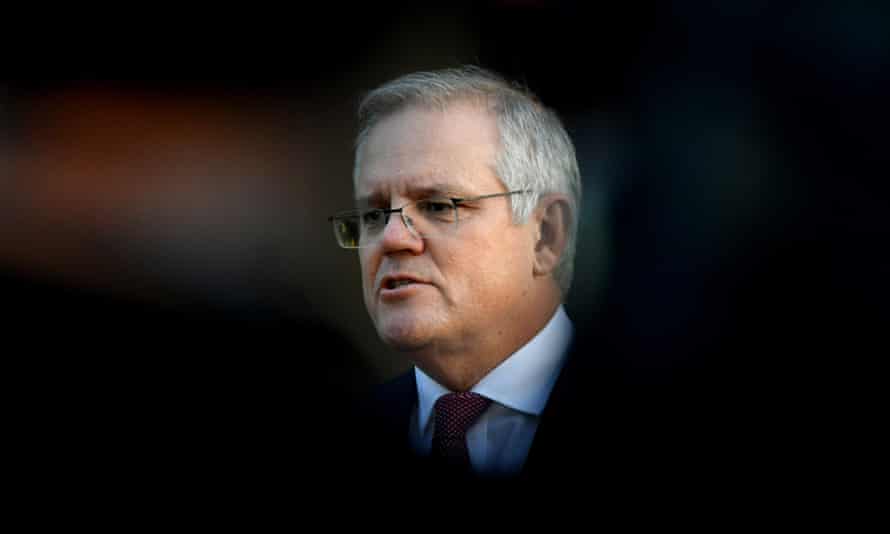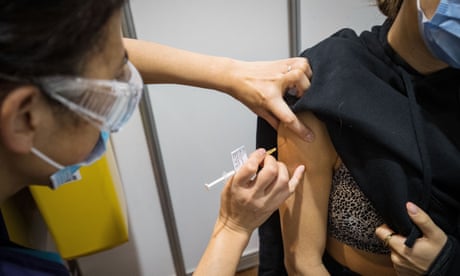Labor says more than half of Australians are in Covid lockdown because of the prime minister’s failures

Last modified on Sat 17 Jul 2021 06.02 AEST
Scott Morrison has been accused of misrepresenting advice from the government’s immunisation advisers, Atagi, who he has sought to blame for the slow rollout of Australia’s vaccination program.
The prime minister has incorrectly claimed that Atagi made an “assumption” in its vaccine approval planning that Covid-19 cases would remain low – when their advice on AstraZeneca vaccines in fact warned the opposite.
Morrison made the comments on Thursday, doubling down on an earlier attempt to blame the Australian Technical Advisory Group on Immunisation for the botched rollout.
Labor accused Morrison of “misrepresenting” Atagi’s advice in an attempt to shift the blame for Australia’s rollout. As of Friday only 12.95% of the eligible population over 16 was fully vaccinated, due to an overreliance on AstraZeneca and the bulk of Pfizer doses not expected to be available until the final three months of the year.

On 8 April Atagi advised people under 50 to get Pfizer vaccines, as the risk of complications from blood clots from AstraZeneca was greater than the risk of Covid-19 for that group.
On Thursday, Morrison said the government had “received medical advice that has changed on two occasions”.
“And that medical advice is, as I made very clear to Atagi at the time, was based on an assumption that the cases in Australia would remain low,” he told ABC’s AM.
“Now, I never made that assumption … And the balance of risk assessment that Atagi are very clear about that, were based on low case numbers in Australia.”
Morrison said that as case numbers had increased, Atagi’s advice had changed, which had “created some confusion in the public”.
Although Morrison is correct that Atagi’s balance of the risk and benefit of AstraZeneca was made at a time of low cases – the original advice explicitly warned low cases may not continue forever.
“While Australia currently has very low or no community transmission of Covid-19, this could change, particularly in the context of high global transmission rates, including of new variants of the virus,” Atagi said on 8 April.
“Although Australia has had few deaths from Covid-19 in young adults until now, large outbreaks in other countries have caused many thousands of deaths in young adults, indicating that the risk for serious outcomes exists across the age spectrum.”
Labor’s shadow health minister, Mark Butler, said that “with Scott Morrison it’s always someone else’s fault”.
“It’s the prime minister’s responsibility to lead the nation, but 18 months into the pandemic and five months into the rollout he’s misrepresenting Atagi advice,” Butler told Guardian Australia.
“Scott Morrison has failed to roll out the vaccine and set up purpose-built quarantine. Because of his failures more than half of the country is in lockdown and the other half have restrictions imposed upon them.”
Although Atagi advised under-40s that Pfizer was the preferred vaccine for their age group, it also noted individuals may consult their GP and take the AstraZeneca vaccine if the benefits outweighed the costs.
In a late-night press conference on 8 April, Morrison told reporters in Canberra that the government had received the advice from Atagi just 15 minutes before announcing it to the public, because it was important that it be “available immediately to Australians”.
After disseminating the advice near-instantaneously, it took the government more than two months to implement measures to facilitate younger Australians’ access to AstraZeneca.
On 28 June, Morrison announced that national cabinet had agreed to a no-fault indemnity scheme for GPs to consult with patients about vaccines, and used his press conference to encourage those under 60 to consult their GPs about receiving AstraZeneca.
In answer to a question, Morrison confirmed that under-40s would now be eligible for AstraZeneca vaccines, which prompted a backlash particularly from the Queensland premier and chief health officer and doctors, who said they were caught by surprise.

On Wednesday, Morrison told 2GB radio that 20,000 people under 40 had received the AstraZeneca vaccine since his comments on 28 June.
Those comments drew an angry reaction from Debra Petrys, the former consumer representative on Atagi for nine years before her retirement in June, who labelled them “disappointing” and “unfair”.
“This isn’t the time for a blame game – everyone has made the decisions they’ve made, which were the best decisions with the evidence present at that time,” Petrys told Guardian Australia.
Atagi’s co-chair, Prof Allen Cheng, also responded by reminding the government that it remains responsible for making decisions and for the vaccination rollout while Atagi’s role is limited to providing advice.
On Friday, the Labor leader, Anthony Albanese, said that Morrison had “actually undermined the Atagi advice, has been critical of [Atagi]”.
“That’s something I haven’t done,” he told reporters in Canberra. “And that’s something I won’t do.”
Guardian Australia contacted Morrison for comment.
No comments:
Post a Comment